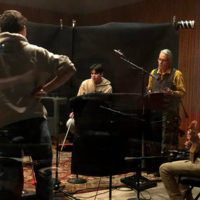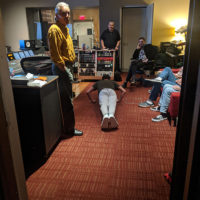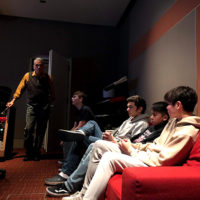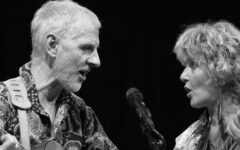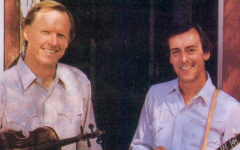
California Bluegrass Association Lifetime member, Keith Little, is a native of the northern California Sierra Nevada foothills. He is a multi-instrumental performing and recording artist, vocalist, composer, and producer with a lit of credits (Vern Williams, Rose Maddox, Peter Rowan, David Grisman, Dolly Parton …) far too large to itemize here. He performs as a solo artist, with his group, The LittleBand , and with several other national touring bands. He operates Slate Mountain Music, which includes a recording studio, production services, and a publishing company affiliated with Broadcast Music Inc.
Hi Keith. What have you have been up to during COVID?
Thanks for asking.., this past year has been an interesting one for sure. It took us all a bit of time to realize that a return to live performing was going to take a while. At the start of 2020, my summer season looked really promising, and within a very short period of time the corporate sponsors and foundational support for festivals and concerts we had on the books simply pulled out, and the shows were canceled. Thank goodness the CARES act (and now the American Rescue Act) became law, as it has allowed countless professional players like myself to hang on through last summer without hocking our axes. My band had only one show last year that didn’t get canceled, and that was the Whippoorwill Arts Festival of Americana in late August. It happily morphed into a virtual event, and we filmed our portion live in Sacramento at the Side Door. It was SO much fun to perform together, and I’ll include a link to a song from that show featuring the band in its current lineup.
Longtime fans will recognize the amazing Josh Tharp on banjo, along with the equally amazing Tristan Clarridge on fiddle (also playing tenor guitar and cello on the show). Fans of southern Oregon Bluegrass will recognize the lovely and amazingly talented Miatke sisters – Rainy on mandolin, Lela on fiddle – along with their beautiful mother, Jennifer, singing harmony. We were also honored and lucky to have our favorite bassist, Andrew Conklin, joining the show.
Keith Little Band at the Side Door in Sacramento
That’s great about CARES and ARA helping you. There hasn’t really been much music press on the impact. Can you comment more on the process and such?
I mentioned earlier about our 2020 summer season being canceled due to corporate sponsors and foundations pulling out. What I failed to mention is that they were forced to do so by way of State regulations. In order to protect the health of the general population, the States decided that concert halls, musical venues, recording studios and similar gathering spots were deemed unsafe and nonessential and were shut down. My younger sister alerted me to the federal funds made available to self-employed “gig workers” like myself, so I took advantage of the opportunity and simply applied online. It was a bit daunting at first with so many people applying. The musicians’ union stepped into the info breach and was a big help with the application process. This support has been a god-send for myself and my family. I encourage every professional musician to apply, and to join the musicians’ union if you haven’t done so. I first joined AFM Local 12 in Sacramento 35 years ago, and continued on with Local 257 when I moved to Nashville in 1989. This year I became an AFM life member, which I’m very proud of.
You had a release in the works, what is the status of that?
Some folks may know that I have a small recording studio which I was able to move and relocate in mid-September of last year. This past winter I’ve managed to finish a few projects that have been in the works for a while, one being a Gospel project I produced for a fabulous artist from the Lodi area named Pamela Butler. I’m really proud of how it turned out, and we sent it to the replicator’s this month. My release you asked about is now on the slate for completion, and I plan to have a half dozen or so cuts mastered by the time IBMA rolls around in late September of this year.
You produced a project with the Crying Uncle Bluegrass Band. Tell us about that.
It was actually our second project together, so I already had a good working relationship with these amazing fellows. We decided to approach the recording process in what I consider to be an “old-school” way, capturing nearly everything “live from the floor,” and then using editing as a precision enhancing tool. These guys came to our first pre-production meeting with all of their songs in hand, and well-rehearsed too. We fleshed out and changed the arrangements a small bit, and then made live demos which they whole-heartedly studied in the week or so before the sessions began. It was amazing how much fun and satisfying it was to record this band; the resulting joy can easily be heard on the CD.
There are a lot of young bands in bluegrass these days. What makes CU special to your ears?
Well, they’re breathtakingly virtuosic for one thing, but in addition to that I hear a deep love of music coupled with an abiding appreciation for those who have paved the way and influenced them. Their list is quite long, but it’s not necessary to even know the names. You can hear it when they play together. Call it “soul” if you like, since it’s magical and quite unique in any day and age.
How is it different producing a younger band like that?
Well, there’s no shortage of energy with these guys, and they were more confident and studio-wise than the first go-round. My job was to provide encouragement and direction with the goal of playing together as a band, to harness that amazing individual energy and virtuosity and channel it into music that will still stand up when they’re a bit older, say ten years from now. There was a fun moment that happened on the last studio day, late into the evening when their energy really began to wane. They were so close to getting a good take but were basically running out of gas, and asked if we might postpone or reschedule the song until a later date. We broke for a moment, and I went out on the floor to tell them they were so very close, and it was the eleventh hour. They were simply going to have to reach down deep and grab a handful since we couldn’t afford to reschedule. The very next take was the magical keeper, but they didn’t believe it at first and wanted to have another take. I told them they could, but they’d first have to beat me at push-ups. While Opus engineer Dave Luke and I were putting the song together (so they could hear it), all of them were crazily doing pushups all over the studio floor wearing themselves out. It was such a hoot.
Who made you do pushups?
No one really, except that in being a late bloomer I have a very modest strength and flexibility routine which I maintain in order to keep up with teenage musical phenoms like the Crying Uncle lads. What I failed to mention about the pushup story was that the band liked the final take, but decided to ask for another one (after wearing themselves thin doing pushups all over the place) thus precipitating the showdown. Mind you, every last one of those guys could easily wax me in the pushup department, but with their exhaustion handicap and some elder mutual aid from their very funny parents, I prevailed at just over 20 honest ones and we wrapped for the evening.
Crying Uncle Bluegrass Band: Hartfords Real feat. Keith Little, Sharon Gilchrist & Chad Manning
You started in music pretty young. Does working with them bring back memories of your youth?
It certainly does. These guys are so full of music, and with modern access to recorded works from every genre, they’ve developed quickly. They also have incredible support from their parents and mentors, becoming much more well-adjusted as individuals than I was at their age. Still, I remember the excitement of sharing the Stanley Brothers Mountain Song Favorites album with Del Williams when we were teens, which we listened to day and night for weeks. During a break at the studio, the band was listening and studying with that same excitement to everything from Web Pierce to Sister Rosetta Tharp records. So very cool.
What was your first instrument, and how did you come to it?
My parents were both musicians, and appreciators of music. I would often sit on my father’s knee while he played guitar (reaching around me, of course). The tone of the guitar hooked me for good and has never really let go. I was too small to play one at the time, so to be truthful my first instrument was a tenor ukulele. Mother taught me the chords to Ain’t She Sweet, and that was it. I eventually did grow into the guitar, and then the banjo and fiddle after that. I also play a bit of mandolin, and am a string bass and piano wannabe.
What made you decide to come back to California from Nashville where you had a lot of success?
I never really intended to settle in Tennessee, although I’m really grateful for the time I spent there and the many dear friends and opportunities that have continued to bless me ever since. At the time I moved, both of my parents were up in years. Mother was fading rather quickly and I had promised her I would return. It wasn’t as difficult to uproot and replant as I first thought, and I spent the most valuable year or so close by her before she passed on. Dad followed her three years later, and by then I was working all over the country as if nothing really happened.
Do you have any more production projects?
Besides the Pamela Butler album, I’ve been working on a harmony vocal instructional video, which is evolving rather slowly as I love singing with people in person. I’m determined to make it work though, and hope to have something to show at IBMA, along with a few cuts from the pre-COVID solo project.
Your vocal classes at the CBA Music Camp are legendary. What is the one thing people can do to improve their vocals?
I’m a firm believer that anyone can sing. As such, I encourage all vocalists to cultivate the notion that singing takes “energy,” but not “effort.” This is really important, as it’s easier to sing than one thinks. Little red flags should go up when you sense the pleasurable feeling of singing tone in your body becoming difficult to sustain. All manner of things happen when the effort creeps in: basically your tone drops out, intonation takes a hike, and you run out of air (although not necessarily in that order). Once the singer becomes aware of when their “energy” becomes “effort,” they can do something about it. Tone dropout is largely influenced by the lyrics and the note one is trying to sing. Try relaxing when the “effort” spot is approaching, and then sing just the lyric vowel (or another lyric altogether), and see if you can sustain the effortless tone through that section. Then simply build the tone out from there. Listen to Paul Williams sing, and you’ll get the idea. His tone simply floats above the music, and draws the listener in like magic.
What artists and genres do you listen to that may surprise the audience?
It’s difficult to say what would surprise anyone these days, but I’m a huge Motown fan, love Andy Irvine-Paul Brady and The Band equally, along with Aretha Franklin, Connie Smith and Rose Maddox. I love live cuts and board mixes from all the great bands, and have a soft spot for most everything recorded during the “Nashville Sound” era, especially records with the great string bass players: Bob Moore, Joe Zinken and Junior Huskey. Remember King of the Road?
Do you have any engagements you think might happen this year?
California and Oregon are talking of opening back up in mid-June, and I’ve been in touch with festival promoters about hosting us. Susanville is on for late June, and other festivals are hurriedly putting their schedules together. Keep your fingers crossed.
Crying Uncle Bluegrass Band at CBA JAM-A-THON
Copy editing by Jen Miatke

